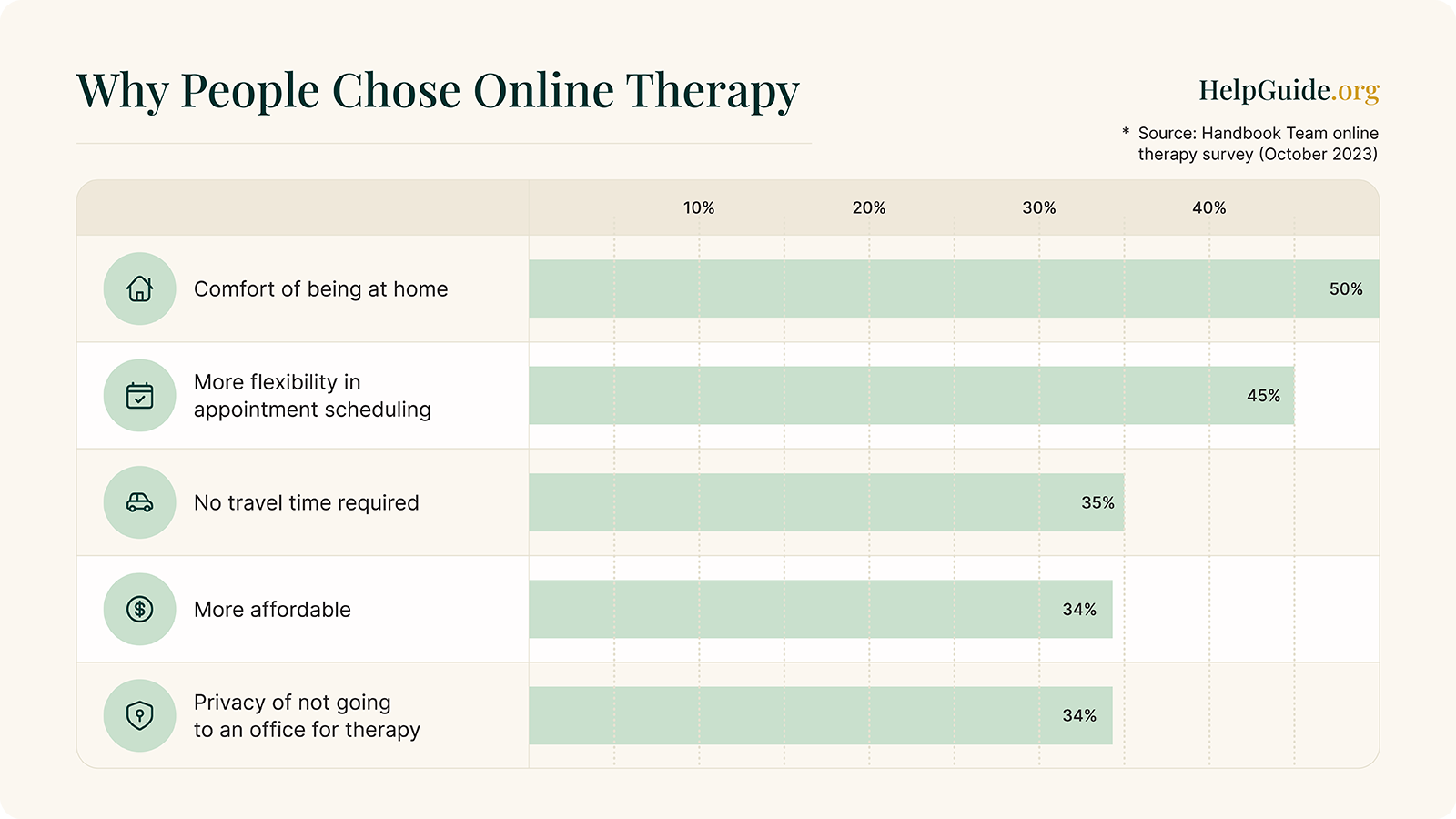Mental health issues, like physical health issues , require proper health care. But in 2023, more than half of Americans diagnosed with a mental health condition did not receive the care they needed. Left untreated, mental illness can even increase the risk of chronic physical conditions such as diabetes and heart disease. Someone’s location, financial stability, or lack of access to transportation and information can all create barriers to care.
Online therapy is a promising solution, erasing some of these roadblocks and providing a lifeline for those in need. In our November 2023 survey of 600 online therapy users, 80 percent of respondents indicated that their teletherapy sessions were effective in addressing their mental health concerns.
To help break down barriers to mental health care, our Handbook Team thoroughly examines online therapy platforms to understand how they can contribute to bridging the accessibility gap. Let us show you exactly how we test, study, and review online therapy platforms.
Why HelpGuide cares about access to timely, affordable mental health care






Your mental health influences how you think, feel, and act in daily life. It also impacts your physical health as well as your ability to overcome challenges and setbacks, cope with stress, and build relationships.
You don’t have to be dealing with a diagnosed mental health problem, such as depression or anxiety, to benefit from mental health care. If you’re going through a difficult time in your life, such as a bereavement, unemployment, or relationship problems, support from a mental health professional can help. Even if you’re facing everyday concerns like overwhelming stress, low self-esteem, or trouble sleeping, the right care can help you make positive changes in your life. In many situations, online therapy or telepsychiatry can be an effective, convenient solution.
Current evidence suggests that for many people online therapy can be just as effective as in-person therapy. Talking from the security of your own home may even make it easier for you to open up about your problems. Online therapy also enables you to communicate with a qualified specialist remotely, while avoiding the expense, travel time, and inconvenience of having to meet in-person.
Ultimately, how well online therapy works often depends on the same factors that determine the success of any type of therapy: the level of connection you make with your therapist, how much you’re able to open up, and the work you’re willing to put into the process.
Finding the right therapist online can take some time and effort, so don’t be afraid to ask questions, read reviews, and take advantage of any introductory sessions. An online therapist will become your partner in healing, recovery, and growth so it’s important to choose someone who makes you feel understood, supported, and cared about. You need to trust this person enough to talk comfortably about intimate and often difficult subjects, and to be honest about what you’re thinking and feeling.
Of course, there can be some drawbacks to online therapy as well. While connecting via text or messaging app, for example, may be a comfortable way of communicating, the lack of face-to-face interaction robs the therapist of gauging your all-important body language and tone of voice. It can also make it harder to build trust and a supportive rapport between you and the therapist, which can be crucial to the success of therapy. That can usually only be achieved in-person or via a live video link.
With online therapy, you’re also reliant on the speed of your internet connection and the reliability of your electronic devices. Online therapy isn’t the right choice in a crisis situation or mental health emergency, either.
In a mental health emergency
Online therapists may not be the most appropriate resource to help in a mental health crisis. If you or someone you know is a danger to themselves or others around them, it is an emergency, and cannot wait for an online therapist’s response.
Don’t wait. You can find help immediately by:
Visiting urgent care
Calling or texting 988 for the Suicide & Crisis Lifeline
Chatting online at 988lifeline.org
Calling the Substance Abuse and Mental Health Services Administration (SAMHSA)’s Helpline at 1-800-662-4357 or text your zip code to 435748
All the above options will connect you with trained professionals who can provide crisis support. You can find even more resources, including international options, on our helpline directory page.
Who are we?
The Handbook Team is made up of writers, editors, designers, medical reviewers, and fact-checkers dedicated to researching, testing, and reviewing health products and services.
We’ve spent over 7,500 hours meticulously evaluating online therapy platforms, down to reading the fine print. We’ve consulted with more than 60 licensed mental health care providers, such as therapists, psychologists, counselors, nurse practitioners, and psychiatrists. We keep up with the latest published research on mental health and online therapy. We’ve also surveyed 1,200 people who participated in online therapy and led focus groups of real users and therapists.
In the end, we researched more than 70 different online therapy platforms, directories, and practices and tested 14 in-depth to find our top choices.
What goes into our review process?
Professional insights
We know that everyone’s mental health journey can look different, so we constantly consult with licensed mental health providers to gain their professional perspectives on mental health care and online therapy platforms.
Mental health care can be a transformative experience for individuals. Knowing who we are and learning to care for ourselves well allows us to create healthy boundaries, feel fulfilled, engage in relationships in a healthy way, feel grounded, secure, and connected, practice our values consistently, and take steps toward a healthy life.
Jillian Zeitler, a licensed professional counselor at Mountainside Treatment Center in Canaan, Connecticut.
Licensed therapists and psychiatrists give us insights into how online sessions work compared to in-person therapy, various app features, and the different types of therapy available. For example, therapists can better follow up with clients using detailed notes from online sessions.
We also learned that in order to broach challenging topics in mental health, therapists may benefit from their clients being in the comfort of their own homes.
The client is in their native setting … in their home. If they’re comfortable, that actually can be a benefit of online therapy, because their body feels safer in the familiar setting.
Ling Lam, a licensed therapist and academic lecturer at Santa Clara University.
Surveys
We conducted two surveys with 600 respondents each to learn more about real users’ experiences with online therapy platforms. We asked questions to find out:
- What mattered to users while choosing a platform.
- How users leveraged features included on a platform.
- The impact of online therapy on different aspects of users’ lives.
- How users felt and navigated data privacy on these platforms.

In our October 2023 survey, we learned respondents often chose to get therapy through telehealth platforms because they preferred the convenience, comfort, and privacy of their homes.
Therapy can be long-term, ongoing care, so we were also interested in how financially sustainable teletherapy subscriptions were for users. In our same October 2023 survey, we learned financial barriers were among the top reasons our respondents stopped using online therapy platforms. We used our findings to inform our testing plans and how we evaluated platforms.
Focus groups
Armed with expert insights and findings from our survey, we conducted focus groups to interview online therapy users and therapists.
We asked users about the factors that led them to their respective platforms and their experience with online therapy in general.
In the comfort of my home, I can be vulnerable. If I were to go into an office, it would feel kind of fake for me. Like I have to be aware of my surroundings, I have to develop this relationship. There’s so much pressure. But because it’s been online, I felt like there’s this new layer to myself where I’ve just felt more humble, more honest with myself.
Focus group participant, online therapy user.
We learned finding a good fit in a therapist can be challenging, even with the amount of choices available on online therapy platforms. One focus group participant said they sought a therapist with a shared cultural identity to feel more connected.
I wanted someone who could connect with me culturally. Because I think there’s just a lot of things that I feel like that therapist would maybe understand that maybe someone that isn’t from my culture wouldn’t.
Focus group participant, online therapy user.
We had the opportunity to interview therapists who provided care through online therapy platforms. We asked about their experiences and any advantages or disadvantages of teletherapy.
The disadvantage that comes with [online therapy] is when the internet goes out, or certain things happen, then it can interrupt at a time where the client could be in a crisis, and you can’t maneuver as quickly as you can if they’re right across from you.” —Focus group participant, therapist.
From our focus group
In-depth research
Our Handbook Team deeply researched more than 70 online therapy platforms, directories, resources, and apps to document what real users encounter when researching the many options on the market.
We were interested in cost, plans offered, features included, provider availability, and customer service. We contacted customer support with questions to gauge responsiveness and helpfulness. We documented our findings and compiled our data to decide which platforms to test.
Real-user testing
Members of our Handbook Team came together to test 14 of the most popular online therapy platforms over a minimum of four weeks. We laid out a series of milestones in our testing process to uniformly assess platforms’ affordability, availability, and customer satisfaction.
Our testers rigorously examined sign-up processes, features, apps, video conference technology, therapist switching processes, and customer service.
We weren’t interested in our testers’ therapist experiences; rather, we were interested in how the platform impacted their experience of online mental health care. One tester used their platform’s therapist match features to try out different types of therapy:
From our tester
“I’ve been through many therapists before, but I was surprised when I found a therapist who specialized in my concerns and had a different approach to therapy. I learned a new perspective to frame my ongoing concerns and connected with a caring provider I felt comfortable with.”
Data privacy
In our October 2023 survey of online therapy users, about three in four (77 percent) of respondents said the digital privacy of an online therapy platform was extremely or very important to them. We researched each online therapy brand’s data privacy practices and procedures to learn more about what information they collect and how it is handled.
We examined each platform’s data privacy policy and compared how frequently they updated the policy. For each policy, we read closely to see if the platform asked for consent to collect your data, if it clearly explained how the platform handles your data, and how you can request that your information be deleted.
Online therapy platforms have a responsibility to protect your data in the following ways:
- Health care providers are responsible for safeguarding your protected health information (PHI) under HIPAA.
- Platforms aren’t allowed to sell or use your PHI for marketing purposes without your permission under the Health Information Technology for Economic and Clinical Health (HITECH) Act.
What’s covered by HIPAA?
The HIPAA Privacy Rule protects your PHI from being disclosed to other parties to ensure your privacy. Your PHI can include your name, Zip code, birth date, and contact information, collected from your medical record and used to make your health care decisions.
Although the information shared between you and your online therapy provider may be considered PHI, data collected by the online therapy platform may not be. In contrast to PHI, personally identifiable information (PII) can still be the same information—your name, date of birth, zip code, etc.—but it’s not covered under HIPAA. PII can also be data collected through questionnaires (i.e., onboarding questionnaires for online therapy platforms), which may be disclosed to third parties with your consent.
How your data is collected and used can be outlined in a Terms and Conditions agreement, Privacy Policy page, or a website disclosure. Many sites have Terms and Conditions that assume your consent to data collection simply by using their website, but some online therapy sites we visited had a popup asking you to acknowledge their data-sharing policy.
Your PII is protected under the Privacy Act of 1974 from being disclosed without your consent. Unlike the HITECH Act, there currently aren’t any laws regulating the collection and sale of PII by private companies like online therapy sites. The Federal Trade Commission (FTC) is a federal agency that enforces laws to protect consumers’ privacy.
We specifically looked to see how brands collected and used PII and if they spoke about the difference between PII and PHI in their privacy policy and terms. If this information was not clear on a brand’s website, we reached out to them directly for comment. For example, we asked Talkspace about the data they collect and if they use it for advertising purposes. Here is what Talkspace told us: “We share very limited information about the individuals who visit our website with companies that provide advertising services on the web or on social media. We do not share any therapeutic health care information or even information about a consumer’s potential interest in specific therapy conditions or potential diagnosis on Talkspace’s site. We do not sell user data nor share PHI (protected health information) or treatment data for marketing or advertising purposes.”
We then looked for data processing standards like the Health Information Trust (HITRUST) alliance certification and if their practices follow the requirements of the HITECH act. This act regulates the electronic transmission of health information. We also investigated whether or not platforms encrypted your data and the type of encryption they used. Finally, if any brand has previously been subject to fines or penalties related to data privacy violations, we clearly outline the details of the violation and the steps the brand has taken to become compliant in our reviews.
Data privacy concerns aren’t limited to online therapy platforms. We recommend reading through the privacy policies of any online app or platform to understand what data will be collected, how it will be collected, and what the platform does with your data.
Members of our Handbook Team tested online therapy programs for at least one month. Our testers went behind the paywall to see what the platform offered and how it impacted their experience. Knowing mental health care is a very individualized experience, our team evaluated the platforms based on objective criteria. We logged data points about features, user experience, affordability, and availability for each online therapy platform we evaluated.
Here’s what we asked when we tested the top online therapy programs:
- How easy was it to find a therapist who was a good fit? Finding a professional you’re comfortable with can make a huge difference in your mental health journey. We tested how easy it was to match with and switch therapists.
- How quickly can you start with a new therapist? Getting help when you need it means getting an appointment within a few days, not a few weeks. We noted how long it took to match with a therapist, book a new appointment, and whether therapists had availability that suited our testers’ schedules.
- Were the plans on the online therapy platform affordable? Platforms may offer monthly subscriptions for online therapy, but how financially accessible are they? We compared the monthly cost commitment of each plan and looked at whether platforms accepted insurance, offered discounts, or had financial aid.
What features were included? Journals, activity logs, or workshops may be additional resources included with online therapy platforms. We asked whether these extras made a monthly subscription more valuable in supporting users’ mental health.
The five most important things to know about online therapy platforms
Can online therapists practice across state lines?
We researched current licensure requirements for teletherapy providers, specifically how providers can work with clients across state lines. While each state has its own licensing boards for mental health professionals, many states have laws, regulations, and exceptions that allow providers to offer services across state lines, especially for telehealth purposes.
Some states offer licensure reciprocity for neighboring states, which means that they recognize licenses granted in the other state and allow those professionals to provide services in their state. Others allow out-of-state professionals to practice telehealth in their state through telehealth registrations, which require the providers to meet various state requirements and register with the state’s licensing board.
Another way that states allow out-of-state providers to operate is through licensure compacts. These are agreements between multiple states that allow a professional licensed in one state to provide services in any other state that is part of the compact. For example, the Psychological Interjurisdictional Compact (PSYPACT) is an interstate agreement that allows professionals to offer telepsychology services across state lines for any state that is part of the agreement. 39 states are currently part of PSYPACT.
It’s important to learn your state’s policies and laws around telehealth and out-of-state licensing as they could impact how online therapy works for you.
How do online therapy brands ensure their therapists are qualified?
We evaluate the online therapy brands we recommend to see how they ensure they hire qualified mental health professionals. We asked brands about their quality control and assessment practices for the therapists on their platform. While each brand has its own set of requirements, one common factor among the best brands is that they only hire licensed professionals.
BetterHelp, for example, requires applicants to provide their license and proof of identity, which BetterHelp then cross checks with the relevant state licensing board. Additionally, applicants must complete a case study that is graded by a licensed BetterHelp clinician. Therapists must then undergo a background report and BetterHelp conducts periodic checks through the National Provider Data Bank (NPDB). This is an online database operated by the Department of Health and Human Services that collects reports on health care practitioners so that licensing boards, hospitals, health plans, employers, and other organizations can learn if a provider is in good standing.
BetterHelp also told us that they have “dozens of QA and clinical quality control processes in place for providers on the platform.” This includes an “in-house clinical operations team” that “oversees these processes and our therapist community. The clinical operations team at BetterHelp is a team of licensed therapists and clinicians themselves.” According to BetterHelp, “The goal of the clinical operations team is to uphold high quality mental healthcare, so they do have measures in place to suspend and terminate therapists who are not meeting those requirements.”
You can review the hiring and training policies of any online therapy brand before you sign up. If this information is not easy to find on their website, you should ask their customer service to provide it to you.
Bottom line
Everyone should have affordable access to mental health care. Online therapy can be a convenient way to get help from a licensed therapist or psychiatrist from the convenience of your home, but whether it’s right for you will depend on your individual needs and preferences.
We consulted with experts, gathered real-user data, and tested the top online therapy platforms to provide the most helpful information for our readers. We hope our insights empower you to make highly informed decisions about your mental health care.





